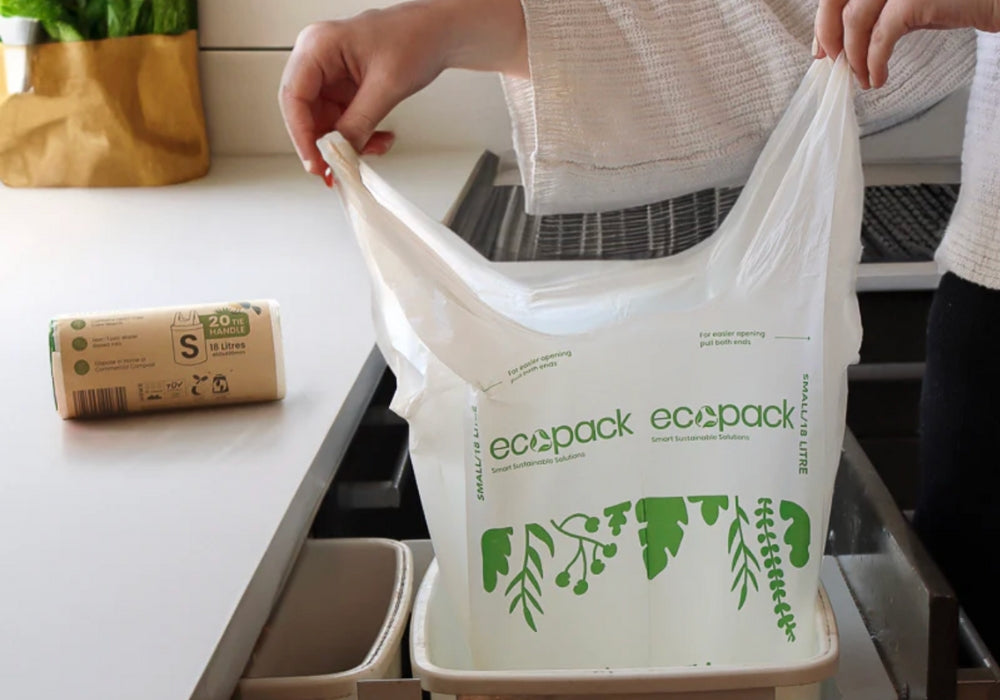
How do I choose the right liner for my bin?
Choosing the right bin liner might seem like a mundane task, but it can make a significant difference in managing your waste efficiently. From kitchen scraps to everyday household rubbish to commercial waste, the right bin liner can prevent unnecessary leaks, odours, and mess. So, here are some key considerations to make sure you select the right bin bag:
Choose the right material for the job
Once upon a time you only had a choice between conventional plastic (polyethylene) and kraft paper clean sacks - but now there’s a multitude of options with significant variations in material quality and environmental impact. Think about what kind of waste you’re disposing of to help guide you on which bin liner material to choose.
If the bin is going to be filled with organic waste or food scraps or green waste then consider a compostable bin liner, which will break down along with its contents.
If your bin fill be filled with general waste destined for landfill, then consider using a recycled plastic bin liner, which is less environmentally intensive to produce than more virgin plastic.
Size up your bin
Bin liners come in various sizes - from extra small 6L caddies right through to large 240L wheelie bins. Refer to our Rubbish Bin Size Guide to help determine what size your bin is. Generally, you’ll want to choose a slightly larger bag to ensure it will hold your waste effectively (but ensure the liner fits snugly without excessive overhang).
Select a bag that’s strong enough to handle the weight of your rubbish
The thickness of a bin liner is crucial for its durability and resistance to tearing. The thickness of plastic bags is measured by a unit called Microns (Mu). Thicker liners, with more microns, are more robust and suitable for heavier or sharper items. For regular household or office waste, a medium thickness (or “all purpose” liner) is usually sufficient. But for garden waste or construction debris, opt for a heavy-duty liner to prevent punctures and leaks.
Choose a trusted brand with genuine credentials
Choosing a reputable brand can ensure consistent quality and reliability. Read reviews from other users to gauge their experience with durability, strength, and overall satisfaction with the bin liners you’re considering.
If you’re shopping for compostable bin liners, make sure they’re certified for both home and commercial composting with Australasian Bioplastics Association and/or TUV Austria certification marks (Ecopack compostable bin liners feature both). And, likewise, if you’re shopping a recycled bin liner range look for the GSR mark. Or for the recycled ocean-bound plastic bin liner range look for the SEArcular mark.
Do you need a particular bag closure?
A good bin liner should securely close at the top to contain odors and prevent spills when the bag is being carried out. You can achieve this, even with a flat top bag, if there’s enough overhang to tie off the liner. But it’s made considerably easier if the bin liner comes ready with a wave top, tie handles, or string.
Do you really need a perfumed bag?
Some bin liners come with artificial fragrances to mask odours. Scented liners contain additional chemicals that could be a concern for some users - and the environment. We recommend unscented liners as a safer choice.
Balance cost and value
While cost shouldn’t be the only factor, it’s worth comparing prices across different brands and types of bin liners. Sometimes, paying a bit more for a higher-quality liner can save money in the long run by reducing the frequency of pulling out a dud. Bin liners are a convenience consumable item, so they need to be fit for purpose!
When you find the right bin liner consider bulk buying
We all go through bin liners regularly, so buying in bulk can often save money and reduce packaging waste over time. If you shop online at ecobags.co.nz, you’ll automatically be given a discounted price when you bulk buy.
Please note that if you’re buying compostable bin liners in bulk you’ll need to consider shelf-life. Compostable products should be used within 12-months of manufacture.
By choosing wisely, you can effectively manage waste disposal while minimising environmental impact and ensuring cleanliness and convenience in your home or business. Whether you opt for compostable bin liners, heavy-duty recycled plastic, or all-purpose ocean-bound plastic varieties, you’ll find the perfect bin liner on ecobags.co.nz to suit your needs.

